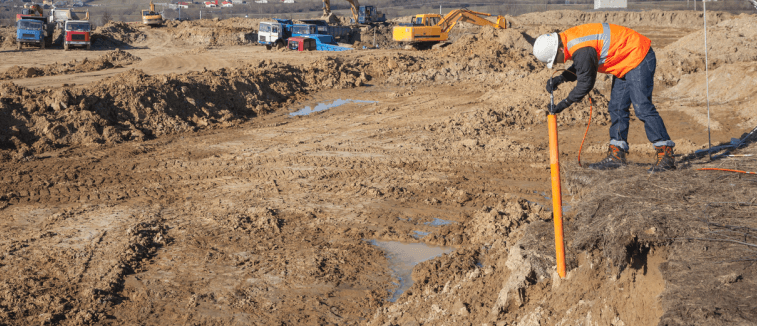The Definitive Guide to Geotheta
The Definitive Guide to Geotheta
Blog Article
The Greatest Guide To Geotheta
Table of ContentsThe Best Guide To GeothetaGeotheta Can Be Fun For AnyoneOur Geotheta IdeasThe 8-Second Trick For GeothetaOur Geotheta Statements

They conduct site investigations, collect samples, carry out research laboratory examinations, and assess data to evaluate the suitability of the ground for building tasks - Geo Tech Engineer. Based upon their searchings for, geotechnical designers give referrals for structure style, incline security, keeping structures, and reduction of geotechnical dangers. They work together with various other professionals, such as engineers, architectural designers, and building teams, to make sure that geotechnical factors to consider are integrated into the overall task design and execution
By evaluating the habits and homes of dirt and rock, they can identify potential geotechnical threats such as landslides, dirt settlement, or incline instability. Their experience aids protect against failures or accidents that could threaten lives and residential or commercial property. Right here are some in-depth obligations and duties of a geotechnical engineer: Site Examination: Geotechnical designers conduct site investigations to collect data on subsurface problems.
They interpret the information to recognize the residential or commercial properties and actions of the soil and rock, including their toughness, permeability, compaction attributes, and groundwater problems. Geotechnical Analysis and Design: Geotechnical engineers evaluate the data gathered throughout site examinations to assess the stability and viability of the site for building jobs. They carry out geotechnical estimations and modeling to evaluate factors such as birthing capability, settlement, slope stability, lateral planet pressures, and groundwater circulation.
Fascination About Geotheta
Structure Design: Geotechnical engineers play an important function in making structures that can safely support the designated framework. They examine the soil conditions and load needs to figure out the appropriate structure kind, such as superficial foundations (e.g., footings), deep structures (e.g (https://www.abnewswire.com/companyname/geotheta.com_139529.html#detail-tab)., heaps), or specialized strategies like soil enhancement. They take into consideration factors such as settlement limits, birthing ability, and soil-structure interaction to create ideal structure styles
They assess building strategies, screen site tasks, and perform field evaluations to confirm that the layout referrals are adhered to. If unforeseen geotechnical problems emerge, they assess the situation and give recommendations for remediation or changes to the style. Risk Analysis and Reduction: Geotechnical engineers assess geotechnical threats and threats connected with the job website, such as landslides, liquefaction, or soil disintegration.

Partnership and Communication: Geotechnical designers work carefully with various other specialists associated with a job, such as engineers, structural engineers, and construction teams. Effective communication and cooperation are vital to integrate geotechnical considerations right into the general job design and building procedure. Geotechnical engineers offer technological experience, answer inquiries, and make certain that geotechnical demands are met.
Geotheta Can Be Fun For Everyone
Below are some kinds of geotechnical designers: Structure Engineer: Structure designers specialize in making and examining foundations for frameworks. They evaluate the soil conditions, lots needs, and website attributes to establish one of the most proper structure kind and style, such as shallow foundations, deep foundations, or specialized techniques like heap structures.
They evaluate the factors influencing slope stability, such as soil residential properties, groundwater problems, and incline geometry, and develop methods to avoid incline failures and reduce threats. Quake Engineer: Quake engineers focus on examining and creating structures to withstand seismic forces. They analyze the seismic risk of a site, examine soil liquefaction capacity, and establish seismic design standards to ensure the safety and strength of frameworks throughout earthquakes.
They carry out area testing, accumulate examples, and examine the gathered information to characterize the soil buildings, geologic formations, and groundwater problems at a website. Geotechnical Instrumentation Engineer: Geotechnical instrumentation designers concentrate on tracking and measuring the behavior of soil, rock, and structures. They install and maintain instrumentation systems that keep an eye on elements such as dirt settlement, groundwater levels, slope movements, and architectural displacements to evaluate efficiency and provide very early warnings of potential issues.
Geotheta Fundamentals Explained
They conduct examinations such as triaxial examinations, loan consolidation examinations, direct shear examinations, and permeability examinations to collect information for geotechnical analysis and layout. Geosynthetics Engineer: Geosynthetics engineers focus on the layout and application of geosynthetic materials, such as geotextiles, geogrids, and geomembranes. They use these materials to boost dirt security, strengthen inclines, provide drain solutions, and control disintegration.
They have a tendency to be investigatory people, which indicates they're intellectual, reflective, and investigative. They are curious, methodical, sensible, logical, and sensible. Some of them are additionally social, suggesting they're kind, charitable, participating, person, caring, useful, empathetic, skillful, and pleasant - Geo Tech Engineering.
In the office atmosphere, geotechnical designers make use of specialized software program devices to carry out computations, create styles, and assess information. They prepare records, testimonial task specifications, connect with clients and group members, and coordinate job activities. The office setting supplies a helpful setting for research, analysis, and cooperation with various other experts involved in the project.
9 Simple Techniques For Geotheta
They regularly go to task sites to perform site investigations, examine geotechnical problems, and collect information for analysis. These sees include taking a trip to various places, occasionally in remote or difficult surfaces. Geotechnical engineers might do soil sampling, conduct tests, and display building activities to ensure that the geotechnical facets of the task are being carried out correctly.
Geotechnical engineers also function in specialized geotechnical research laboratories. Geotechnical research laboratory engineers work extensively in these atmospheres, handling screening tools, running tools, and videotaping information.
Report this page